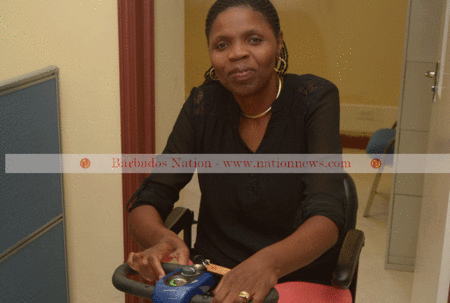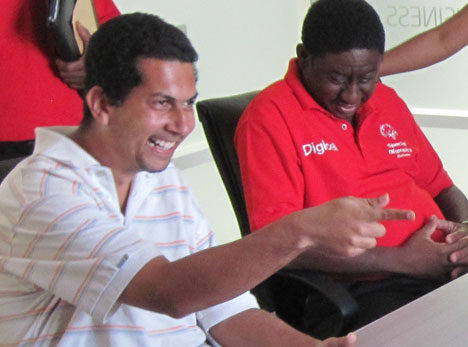MULTIPLE SCLEROSIS (MS) is a condition that is not widely talked about in Barbados.
Its impact though is no small issue. That was a reality that hit home for Maria Holder-Small following her diagnosis with the condition ten years ago.
For the last four years she has been using a wheelchair or motorised scooter to get around and at one point had lost the vision in her left eye.
Holder-Small, who is president of the Barbados Council for the Disabled, has become an advocate for MS awareness as well as the cause of people with disabilities.
She said the disorder was very difficult to diagnose because of its many neurological symptoms, so she spent six months undergoing test after test and thousands of dollars without getting a diagnosis.
“It started with an unsteady gait, where I would be walking and think I am walking straight and then I would get comments like ‘Maria you did drinking last night; so early this morning and you drunk’. We would pass it off as a joke, but I was not even aware that I was walking unsteadily,” Maria said.
Frequent falls
The condition progressed to a point where even when she was undergoing tests she started having frequent falls while at work and at that time she and her husband and family were desperately trying to find out what was going on.
However, she was fortunate enough to get in contact with a Texas-based doctor of Barbadian parentage and was getting ready to fly up for a consultation but it happened that the doctor had to visit Barbados and saw Maria while here.
In one afternoon, Maria would have her diagnosis.
As someone who had never heard of MS before, it was a real learning experience for her, but she said that when she reflected on her childhood and young adulthood there were telltale signs all along. Maria used to experience severe back pains even though she had not played sport or been very active.
However, she said other than that her childhood was normal; she never used to be sick other than with the common cold.
Even in her job as a supervisor she seldom had a sick day. But that was about to change.
“When you are working for a company for a period of time and you can no longer give that amount, you become the liability so the sick leave had my boss worried,” Maria said. She would later be declared medically unfit for work.
Going from someone who was active and working to a wheelchair user was a difficult transition for Maria, who drew on her faith, family and friends to help in the transition.
“If you do not have persons there to give you that support I can see where the depression would set in,” she said.
She and her husband Steven will celebrate their 19th wedding anniversary this year. She said the longevity of their marriage was proof that some people really mean it when they make the vow “for better or worse, in sickness and health”.
Even with all the support, one of the biggest changes for Maria was giving up driving. She loved to drive and had her licence from the time she was a teen.
Multiple sclerosis, as the name suggests, impacts multiple organs and parts of the body. It is a lifelong condition that affects the central nervous system (the brain and spinal cord), and affects different people in different ways. Maria said: “The question is not what it affects, but what does it not affect? It affects a single area of your body but what affects one person would not necessarily affect another.”
In the Multiple Sclerosis Society of Barbados Maria said there are people who cannot see, some who cannot walk, and some with cognitive problems, memory loss and vocal challenges. For Maria, she has lost sensation in her legs, and can no longer stand up.
No joy sitting in chair
For years Maria said she fought having to use a wheelchair. She used a cane, then moved to a quad pod, to a rollator, to a walker and now her motorised scooter.
“For me it is not a joy sitting in this chair; the sidewalks, kerbs and access to stores make doing business in Barbados very difficult,” she said.
“That makes me feel like I am excluded, my money is not important. I would like to think that access should be for all. The time you take to build a step you can make it a ramp.”
Six years ago, through optic neuritis she lost her vision in left eye but it returned in over a year.
Admittedly Maria has had those moments when she pondered her lot, but she has never wallowed in self-pity.
“It did come but I never allowed it to obsess me what I spent so much time on trying to say why me that I let it get me down,” she said. “In one moment I asked: ‘Why this? Why now?’ I had just finished a course and had applied to pursue a bachelor’s degree In human resource management, so for me, it was a huge blow.”
Maria said she would use her experience to show others that they should never give up.
“I always say, hold you head up the rain will not always fall, the sun will come out.”
This article is compliments the Nation News Paper
Article Written by LISA KING




 Ever heard the saying “it’s better to give than to receive” well that also applies to time. By volunteering we support an organization or cause and make a great difference in our communities. It’s also a great way to meet new people and learn about the challenges they face daily. Consider giving more than just money, give your time !
Ever heard the saying “it’s better to give than to receive” well that also applies to time. By volunteering we support an organization or cause and make a great difference in our communities. It’s also a great way to meet new people and learn about the challenges they face daily. Consider giving more than just money, give your time !

